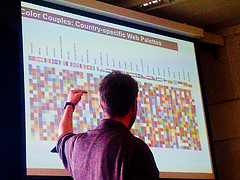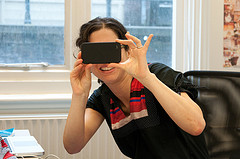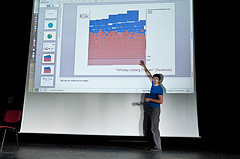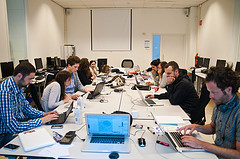Otherwise Engaged.
Critical Analytics and the New Meanings of Engagement Online




Digital Methods Winter School 2016
11-15 January 2016
Opening day location, 11 January, 9.30am:
Compagnie Theater (upstairs in the grote zaal or large auditorium)
Kloveniersburgwal 50
1012 CX Amsterdam Everyday winter school location:
Digital Methods Initiative
University of Amsterdam
Turfdraagsterpad 9
1012 XT Amsterdam
Winter School Welcome Package & Reader, http://bit.ly/dmi16wswelcomepackage Winter School projects to be pitched, http://bit.ly/dmi16wsprojectdescriptions Lunch (and coffee) places, http://bit.ly/lunchandcoffee
Digital Methods Winter School, Data Sprint and Mini-Conference The Digital Methods Initiative (DMI), Amsterdam, is holding its annual Winter School on Critical Analytics and the Meanings of Engagement. The format is that of a data sprint, with hands-on work on engagement metrics for political, social and media research, together with a programme of keynote speakers and a Mini-conference, where PhD candidates, motivated scholars and advanced graduate students present short papers on digital methods and new media related topics, and receive feedback from the Amsterdam DMI researchers and international participants. Participants need not give a paper at the Mini-conference to attend the Winter School. For a preview of what the event is like, you can view short video clips from previous editions of the Summer School in 2015 and 2014. Keynote speakers for this edition will include Lilie Chouliaraki, Professor of Media and Communications at the London School of Economics (LSE) and winner of the International Communication Association's 2015 Outstanding Book Award. There will also be a performance and reception for Metahaven's latest book Black Transparency. ‘Otherwise engaged’, the title of the Winter School, implies two projects. The first refers to the (interface) politics of attention whereby online services are variously vying to gain recognition through jumpy banners, push notifications and metrification, including those little red badge numbers on the iPhone that call for labouring and at least marking as read. The other sense refers to how engagement online is currently measured, and how it may be thought of differently and critically if one substitutes return visits and retention rates for forms of political engagement. Given the medium's power to distract and produce continuous partial attention, the term engagement appears oxymoronic when discussing online attention. However, “user engagement metrics” on the web, such as unique visitors, click-throughs, page views, duration and returns, have been joined by social media measures as likes, shares, comments, liked comments summed to indicate most engaged with content. In Google Analytics an entire vocabulary and set of measures exist to capture engagement. More conceptually the idea that content enlivens and animates, continually, has led to distinctions between liveness and liveliness, where the latter would be considered more meaningful engagement. Whilst there is thus the question of when there is only an appearance of engagement and when one is truly engaged, we are also interested in disengagement, and developing metrics for attention-less content, and that which makes one leave the scene.
There is also the question of the relationship between engagement metrics and more established notions of political engagement. Is the online making one more of a remote observer than an on-the-ground actor, as political engagement theorist have discussed over and again in terms of slacktivism and clicktivism. Are there techniques to grasp content and activity that lead to apathy? The accompanying data sprint will seek to work with engagement metrics (and create others) to capture the meaning of activity, inquiring into when one is fully, multiply or otherwise engaged, with data from online media organisations (and selected new-form journalism) as well as campaigning by NGOs.
Slides of the opening day lectures
- Richard Rogers. Otherwise Engaged: Critical Analytics and the Meanings of Engagement.
- Lilie Chouliaraki. Solidarity in the post-humanitarian age.
- Carolin Gerlitz and Natalia Sanchez-Querubin. Platforms doing numbers. A history of numbering practices on YouTube.
- Mathieu Jacomy. Otherwise Engaged with Gephi.
- Liliana Bounegru. What is a Digital Methods Project? Some Highlights from DMI Winter and Summer School 2015.
Project pages
See Winter School 2016 Project Pages. Journalistic pieces:The first selfie-curated museum in the world Blog posts:
Critical digital ethnography
Digital Methods Mini-Conference at the Winter School
The annual Digital Methods Mini-Conference at the Winter School, normally a one-day affair, provides the opportunity for digital methods and allied researchers to present short yet complete papers (5,000-7,500 words) and serve as respondents, providing feedback. Often the work presented follows from previous Digital Methods Summer Schools. The mini-conference accepts papers in the general digital methods and allied areas: the hyperlink and other natively digital objects, the website as archived object, web historiographies, search engine critique, Google as globalizing machine, cross-spherical analysis and other approaches to comparative media studies, device cultures, national web studies, Wikipedia as cultural reference, the technicity of (networked) content, post-demographics, platform studies, crawling and scraping, graphing and clouding, and similar.
Applications: (Remaining) Key dates
If you are participating in the mini-conference the deadline for submission of your paper is 5 January. The mini-conference takes place on Thursday 14 January 2016. Please send your mini-conference paper to winterschool[at] digitalmethods.net . To attend the Winter School, you need not participate in the mini-conference.Fees & Logistics
The fee for the Digital Methods Winter School 2016 is EUR 595, or if you would like to receive 6 ECTS credits the fee is EUR 695. Bank transfer information was sent along with the notification on 11 December 2015. Students at the University of Amsterdam do not pay fees. For those taking the course for credits, see the official course catalogue entry. Participants from LERU as well as U21 universities receive a tuition waver of EUR 500. The Winter School is self-catered. The venue is in the center of Amsterdam with abundant coffee houses and lunch places. Participants are expected to find their own housing (airbnb and other short-stay sites are helpful), or we have available accommodations at the Student Hotel:
The Student Hotel AmsterdamJan van Galenstraat 335
1061 AZ Amsterdam, The Netherlands
Tel: +31 20 760 4000
info-amsterdam [at] thestudenthotel.com
Arrival: 10 January 2016
Departure: 16 January 2016
EUR 290 (This is a new, specially discounted rate!)
The Student Hotel Amsterdam West website
If you would like to have accommodations at the Student Hotel, please write to Simone Lorenz at simone.lorenz [at] thestudenthotel.com.
The Winter School closes on Friday with a festive event, after the final presentations. Here is a guide to the Amsterdam new media scene. For further questions, please contact the organizers, Jonathan Gray and Natalia Sanchez at winterschool[at] digitalmethods.net
.
Please bring your laptop computer, your European plug as well as the VGA adaptor for connecting to the projector.
About DMI
The Digital Methods Winter School is part of the Digital Methods Initiative (DMI), Amsterdam, dedicated to developing methods for Internet-related research. The Digital Methods Initiative holds the annual Digital Methods Summer Schools (nine to date), which are intensive and full time, 2-week undertakings in the Summertime. The 2016 Summer School will take place from 27th June to 8th July 2016.
The Digital Methods book (MIT Press, 2013) provides an introduction to the methodological outlook that frames and informs the work of the DMI. This is accompanied by a companion volume about mapping social and political issues with digital methods: Issue Mapping for an Ageing Europe (Amsterdam University Press, 2015), which is also freely available on the web as an open access monograph. Further information and resources about digital methods can be found at digitalmethods.net - including links to example projects, publications and tools as well as an introductory "founding narrative" about the Digital Methods Initiative and details about associated researchers.
The coordinators of the Digital Methods Initiative are Sabine Niederer and Esther Weltevrede (PhD candidates in New Media & Digital Culture, University of Amsterdam), and the director is Richard Rogers, Professor of New Media & Digital Culture, University of Amsterdam. Liliana Bounegru is the managing director.
Social
For those of you that use Twitter we are using the #DMI16 hashtag as the backchannel for communication. Some pictures from Winter School 2015. Here is the Facebook Group from last year's Winter School. Here are pictures from a variety of DMI Summer and Winter School flickr streams.
| I | Attachment | Action | Size | Date | Who | Comment |
|---|---|---|---|---|---|---|
| |
DMI16_Mini-ConferenceSchedule.pdf | manage | 137 K | 07 Jan 2016 - 21:07 | RichardRogers | DMI Winter 16 Mini-conference schedule |
| |
Otherwise_engaged_with_Gephi.pdf | manage | 4 MB | 11 Jan 2016 - 14:41 | MathieuJacomy | Mathieu Jacomy's slides about Gephi |
| |
dmishow1.jpg | manage | 29 K | 02 Oct 2015 - 12:29 | RichardRogers | |
| |
dmishow2.jpg | manage | 20 K | 02 Oct 2015 - 12:30 | RichardRogers | |
| |
dmishow3.jpg | manage | 16 K | 02 Oct 2015 - 12:30 | RichardRogers | |
| |
dmishow4.jpg | manage | 15 K | 02 Oct 2015 - 12:30 | RichardRogers | |
| |
dmishow5.jpg | manage | 51 K | 02 Oct 2015 - 12:41 | RichardRogers |
 Copyright © by the contributing authors. All material on this collaboration platform is the property of the contributing authors.
Copyright © by the contributing authors. All material on this collaboration platform is the property of the contributing authors. Ideas, requests, problems regarding Foswiki? Send feedback


